英语一般过去时专项训练
- 格式:doc
- 大小:70.00 KB
- 文档页数:10
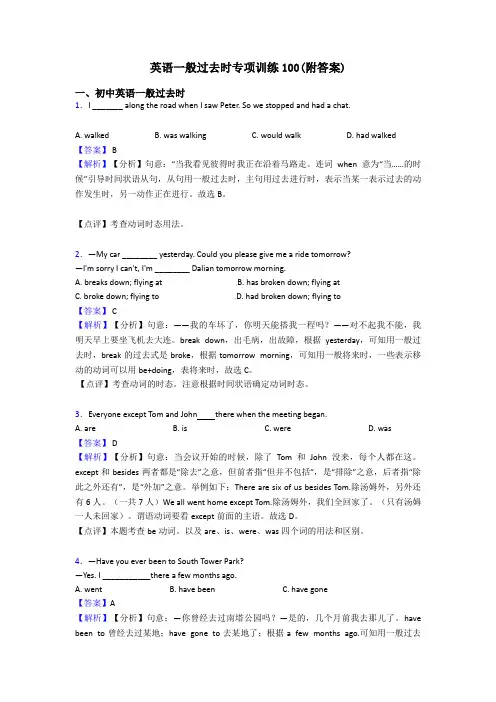
英语一般过去时专项训练100(附答案)一、初中英语一般过去时1.I _______ along the road when I saw Peter. So we stopped and had a chat.A. walkedB. was walkingC. would walkD. had walked【答案】 B【解析】【分析】句意:“当我看见彼得时我正在沿着马路走。
连词when意为“当……的时候”引导时间状语从句,从句用一般过去时,主句用过去进行时,表示当某一表示过去的动作发生时,另一动作正在进行。
故选B。
【点评】考查动词时态用法。
2.—My car ________ yesterday. Could you please give me a ride tomorrow?—I'm sorry I can't, I'm ________ Dalian tomorrow morning.A. breaks down; flying atB. has broken down; flying atC. broke down; flying toD. had broken down; flying to【答案】 C【解析】【分析】句意:——我的车坏了,你明天能搭我一程吗?——对不起我不能,我明天早上要坐飞机去大连。
break down,出毛病,出故障,根据yesterday,可知用一般过去时,break的过去式是broke,根据tomorrow morning,可知用一般将来时,一些表示移动的动词可以用be+doing,表将来时,故选C。
【点评】考查动词的时态。
注意根据时间状语确定动词时态。
3.Everyone except Tom and John there when the meeting began.A. areB. isC. wereD. was【答案】 D【解析】【分析】句意:当会议开始的时候,除了Tom和John没来,每个人都在这。
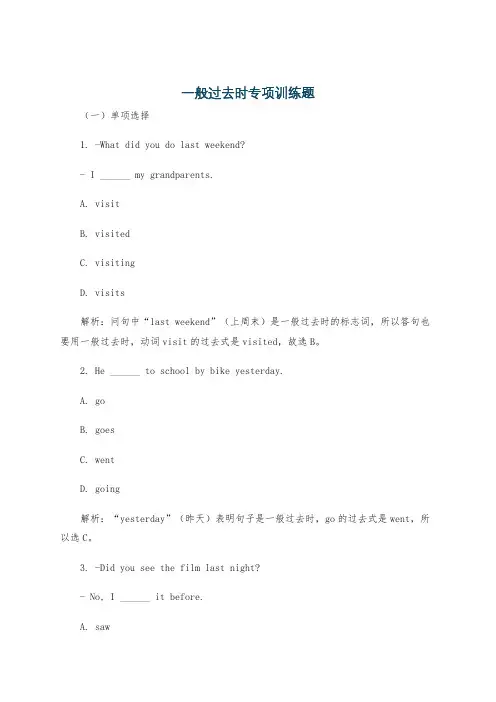
一般过去时专项训练题(一)单项选择1. -What did you do last weekend?- I ______ my grandparents.A. visitB. visitedC. visitingD. visits解析:问句中“last weekend”(上周末)是一般过去时的标志词,所以答句也要用一般过去时,动词visit的过去式是visited,故选B。
2. He ______ to school by bike yesterday.A. goB. goesC. wentD. going解析:“yesterday”(昨天)表明句子是一般过去时,go的过去式是went,所以选C。
3. -Did you see the film last night?- No, I ______ it before.A. sawB. have seenC. seeD. had seen解析:问句是一般过去时,问昨晚是否看电影了。
答句说之前就看过了,“之前看过”这个动作发生在昨晚(过去的时间)之前,是过去的过去,要用过去完成时,过去完成时结构是had + 过去分词,see的过去分词是seen,所以选D。
4. She ______ a book in the library at this time yesterday.A. readsB. readC. was readingD. is reading解析:“at this time yesterday”(昨天这个时候)表示过去某个具体时间点正在进行的动作,要用过去进行时,结构是was/were+动词 -ing形式,主语是she,所以用was reading,选C。
5. My father ______ in this factory for 20 years before he moved to another city.A. has workedB. workedC. worksD. had worked解析:“before he moved to another city”(在他搬到另一个城市之前),moved是过去式,在这个过去动作之前的工作是过去的过去,要用过去完成时,结构是had+过去分词,work的过去分词是worked,所以选D。
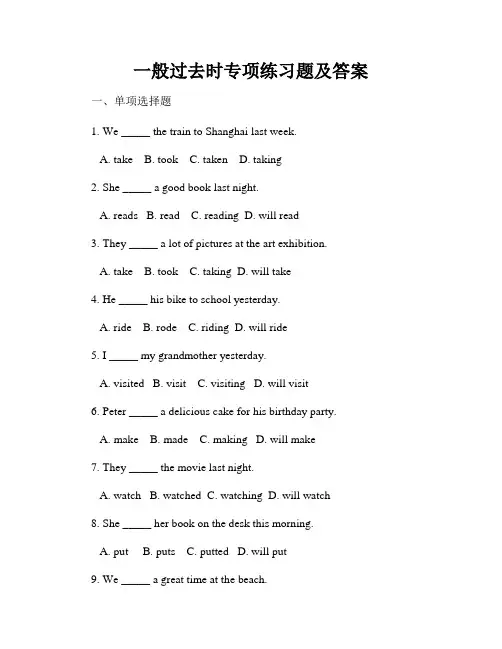
一般过去时专项练习题及答案一、单项选择题1. We _____ the train to Shanghai last week.A. takeB. tookC. takenD. taking2. She _____ a good book last night.A. readsB. readC. readingD. will read3. They _____ a lot of pictures at the art exhibition.A. takeB. tookC. takingD. will take4. He _____ his bike to school yesterday.A. rideB. rodeC. ridingD. will ride5. I _____ my grandmother yesterday.A. visitedB. visitC. visitingD. will visit6. Peter _____ a delicious cake for his birthday party.A. makeB. madeC. makingD. will make7. They _____ the movie last night.A. watchB. watchedC. watchingD. will watch8. She _____ her book on the desk this morning.A. putB. putsC. puttedD. will put9. We _____ a great time at the beach.A. haveB. hadC. havingD. will have10. He _____ a new car two days ago.A. buyB. boughtC. buyingD. will buy答案:1. B2. B3. B4. B5. A6. B7. B8. A9. B 10. B二、用一般过去时填空1. Yesterday, I ______ (go) to the park with my friends.2. She _______ (visit) her grandparents last weekend.3. They ________ (play) soccer in the park yesterday.4. We _______ (have) a great time at the party.5. He ________ (watch) a movie at home last night.6. My mother ________ (cook) a delicious dinner for us.7. Peter _______ (read) an interesting book yesterday.8. They _______ (live) in this city before they moved.9. I _______ (meet) my old friends in the street this morning.10. She _______ (write) a letter to her pen pal yesterday.答案:1. went2. visited3. played4. had5. watched6. cooked7. read8. lived9. met 10. wrote三、将下列句子变为一般过去时1. She reads a book every night.______ ____________________________________.2. He plays soccer with his friends on weekends.______ ____________________________________.3. They go to school by bus every morning.______ ____________________________________.4. I eat breakfast at 7 o'clock every day.______ ____________________________________.5. The dog barks at strangers in the park.______ ____________________________________.答案:1. She read a book every night.2. He played soccer with his friends on weekends.3. They went to school by bus every morning.4. I ate breakfast at 7 o'clock every day.5. The dog barked at strangers in the park.四、根据情境选择合适的动词的一般过去时形式1. What did you do yesterday? (play, watch)I _______ a movie at home.2. Did they have fun at the party? (sing, dance)Yes, they _______ and _______ all night.3. How was your weekend? (relax, work)It was great. I ________ and didn't ________ at all.4. Why were you late for school? (sleep, run)I _______ late because I _______ for the bus.5. Did she visit her grandparents last summer? (cook, swim) No, she _______ and _______ in the ocean.答案:1. watched2. sang, danced3. relaxed, work4. was, ran5. cooked, swam五、判断正误,用T表示正确,用F表示错误1. He played basketball with his friends yesterday. ( )2. They will visit the museum tomorrow. ( )3. We watched TV at home last night. ( )4. My parents cook dinner every day. ( )5. She goes to school by bike. ( )答案:1. T2. F3. T4. F5. F希望本文对您提供的一般过去时专项练习有所帮助。
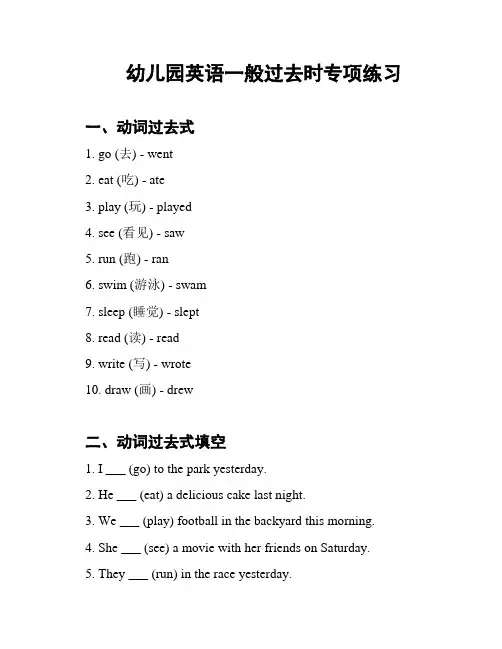
幼儿园英语一般过去时专项练习一、动词过去式1. go (去) - went2. eat (吃) - ate3. play (玩) - played4. see (看见) - saw5. run (跑) - ran6. swim (游泳) - swam7. sleep (睡觉) - slept8. read (读) - read9. write (写) - wrote10. draw (画) - drew二、动词过去式填空1. I ___ (go) to the park yesterday.2. He ___ (eat) a delicious cake last night.3. We ___ (play) football in the backyard this morning.4. She ___ (see) a movie with her friends on Saturday.5. They ___ (run) in the race yesterday.6. He ___ (swim) in the ocean last summer.7. I ___ (sleep) late last night.8. She ___ (read) a book in the library yesterday.9. We ___ (write) a letter to our grandparents last week.10. They ___ (draw) a beautiful picture yesterday.三、选择填空1. I ___ (go/went) to the zoo with my family last weekend.2. He ___ (eat/ate) an apple for breakfast this morning.3. We ___ (play/played) soccer in the park yesterday.4. She ___ (see/saw) a shooting star last night.5. They ___ (run/ran) in the marathon last month.6. He ___ (swim/swam) in the pool yesterday.7. I ___ (sleep/slept) late on Sunday.8. She ___ (read/read) a storybook before bed last night.9. We ___ (write/wrote) a letter to our teacher last week.10. They ___ (draw/drew) a beautiful picture at school yesterday.四、根据句子补充动词的正确形式1. We ___ (watch) a movie last night.2. She ___ (dance) at the party yesterday.3. He ___ (plant) flowers in the garden last spring.4. They ___ (eat) ice cream after dinner.5. I ___ (visit) my grandparents last weekend.6. The cat ___ (catch) a mouse in the kitchen.7. We ___ (clean) our room this morning.8. The dog ___ (bark) loudly at the stranger.9. She ___ (play) the piano beautifully.10. They ___ (study) for the test yesterday.五、完形填空I ___1___ a great time at the zoo with my family last weekend. We ___2___ many different animals there. Dad ___3___ some photos of the lions. Mom ___4___ an ice cream for me. I ___5___ popcorn and watched a dolphin show. My sister ___6___ a toy elephant as a souvenir. We ___7___ a lot of fun! I love going to the zoo!1. a) had b) have c) having2. a) see b) saw c) seen3. a) took b) takes c) taking4. a) bought b) buys c) buy5. a) eat b) ate c) eaten6. a) gets b) got c) get7. a) had b) have c) having六、阅读理解Passage 1Last summer, my family and I went to a beach for vacation. We ___1___ on the sand and ___2___ in the water. I ___3___ a sandcastle with my sister. We also ___4___ a boat and went fishing. ___5___ a great time!1. a) played b) plays c) playing2. a) swim b) swam c) swims3. a) built b) build c) builds4. a) rented b) rent c) rents5. a) Had b) Having c) HavePassage 2Yesterday, I ___1___ a bike ride with my friends. We ___2___ to the park and ___3___ games. After that, we ___4___ ice cream. It___5___ a lovely day!1. a) had b) have c) having2. a) went b) go c) goes3. a) played b) plays c) playing4. a) ate b) eat c) eats5. a) was b) were c) is七、写作请以"My Last Weekend"为题目,写一篇80词左右的短文,描述你上个周末的活动。
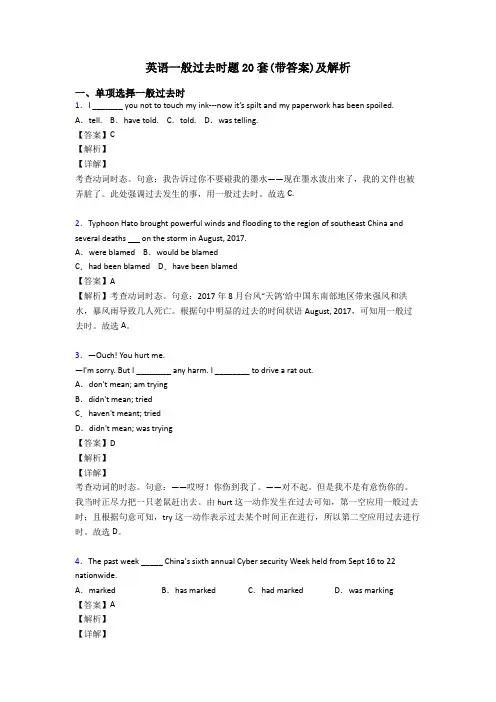
英语一般过去时题20套(带答案)及解析一、单项选择一般过去时1.I _______ you not to touch my ink---now it’s spilt and my paperwork has been spoiled. A.tell. B.have told. C.told. D.was telling.【答案】C【解析】【详解】考查动词时态。
句意:我告诉过你不要碰我的墨水——现在墨水泼出来了,我的文件也被弄脏了。
此处强调过去发生的事,用一般过去时。
故选C.2.Typhoon Hato brought powerful winds and flooding to the region of southeast China and several deaths on the storm in August, 2017.A.were blamed B.would be blamedC.had been blamed D.have been blamed【答案】A【解析】考查动词时态。
句意:2017年8月台风“天鸽‘给中国东南部地区带来强风和洪水,暴风雨导致几人死亡。
根据句中明显的过去的时间状语August, 2017,可知用一般过去时。
故选A。
3.—Ouch! You hurt me.—I'm sorry. But I ________ any harm. I ________ to drive a rat out.A.don't mean; am tryingB.didn't mean; triedC.haven't meant; triedD.didn't mean; was trying【答案】D【解析】【详解】考查动词的时态。
句意:——哎呀!你伤到我了。
——对不起。
但是我不是有意伤你的。
我当时正尽力把一只老鼠赶出去。
由hurt这一动作发生在过去可知,第一空应用一般过去时;且根据句意可知,try这一动作表示过去某个时间正在进行,所以第二空应用过去进行时。
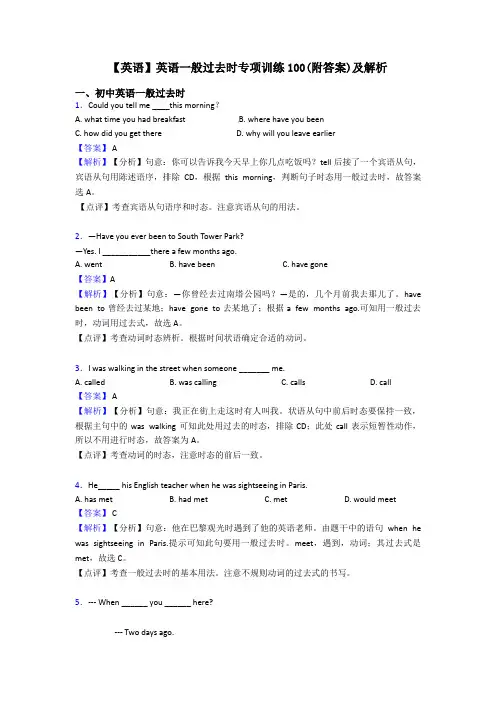
【英语】英语一般过去时专项训练100(附答案)及解析一、初中英语一般过去时1.Could you tell me ____this morning?A. what time you had breakfastB. where have you beenC. how did you get thereD. why will you leave earlier【答案】 A【解析】【分析】句意:你可以告诉我今天早上你几点吃饭吗?tell后接了一个宾语从句,宾语从句用陈述语序,排除CD,根据this morning,判断句子时态用一般过去时,故答案选A。
【点评】考查宾语从句语序和时态。
注意宾语从句的用法。
2.—Have you ever been to South Tower Park?—Yes. I ___________there a few months ago.A. wentB. have beenC. have gone【答案】A【解析】【分析】句意:—你曾经去过南塔公园吗?—是的,几个月前我去那儿了。
have been to曾经去过某地;have gone to去某地了;根据a few months ago.可知用一般过去时,动词用过去式,故选A。
【点评】考查动词时态辨析。
根据时间状语确定合适的动词。
3.I was walking in the street when someone _______ me.A. calledB. was callingC. callsD. call【答案】 A【解析】【分析】句意:我正在街上走这时有人叫我。
状语从句中前后时态要保持一致,根据主句中的was walking可知此处用过去的时态,排除CD;此处call表示短暂性动作,所以不用进行时态,故答案为A。
【点评】考查动词的时态,注意时态的前后一致。
4.He_____ his English teacher when he was sightseeing in Paris.A. has metB. had metC. metD. would meet【答案】 C【解析】【分析】句意:他在巴黎观光时遇到了他的英语老师。
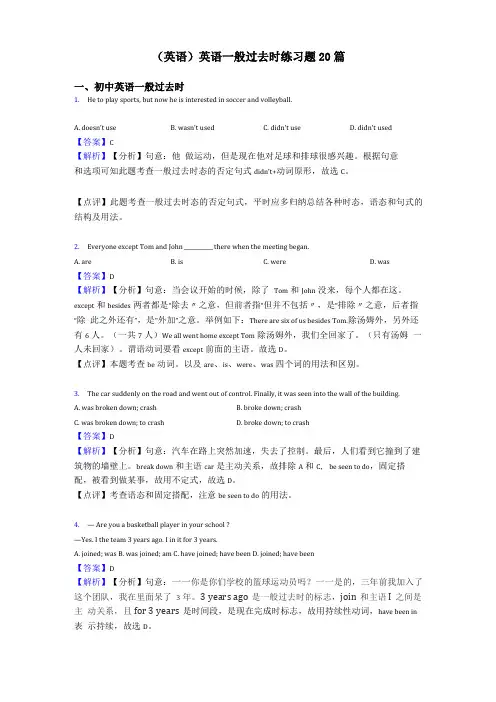
(英语)英语一般过去时练习题20篇一、初中英语一般过去时1.He to play sports, but now he is interested in soccer and volleyball.A. doesn't useB. wasn't usedC. didn't useD. didn't used【答案】C【解析】【分析】句意:他做运动,但是现在他对足球和排球很感兴趣。
根据句意和选项可知此题考查一般过去时态的否定句式didn't+动词原形,故选C。
【点评】此题考查一般过去时态的否定句式,平时应多归纳总结各种时态,语态和句式的结构及用法。
2.Everyone except Tom and John ___________ there when the meeting began.A. areB. isC. wereD. was【答案】D【解析】【分析】句意:当会议开始的时候,除了Tom和John没来,每个人都在这。
except和besides两者都是“除去〃之意,但前者指“但并不包括〃,是“排除〃之意,后者指“除此之外还有”,是"外加”之意。
举例如下:There are six of us besides Tom.除汤姆外,另外还有6人。
(一共7人)We all went home except Tom除汤姆外,我们全回家了。
(只有汤姆一人未回家)。
谓语动词要看except前面的主语。
故选D。
【点评】本题考查be动词。
以及are、is、were、was四个词的用法和区别。
3.The car suddenly on the road and went out of control. Finally, it was seen into the wall of the building.A. was broken down; crashB. broke down; crashC. was broken down; to crashD. broke down; to crash【答案】D【解析】【分析】句意:汽车在路上突然加速,失去了控制。
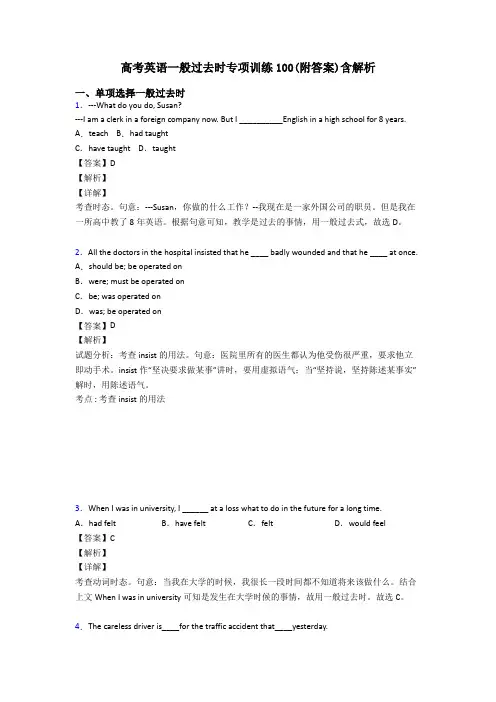
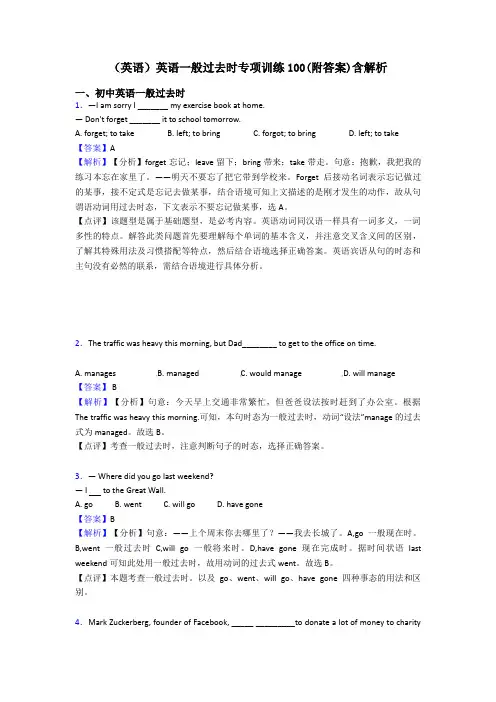
(英语)英语一般过去时专项训练100(附答案)含解析一、初中英语一般过去时1.—I am sorry I _______ my exercise book at home.— Don't forget _______ it to school tomorrow.A. forget; to takeB. left; to bringC. forgot; to bringD. left; to take【答案】A【解析】【分析】forget忘记;leave留下;bring带来;take带走。
句意:抱歉,我把我的练习本忘在家里了。
——明天不要忘了把它带到学校来。
Forget后接动名词表示忘记做过的某事,接不定式是忘记去做某事,结合语境可知上文描述的是刚才发生的动作,故从句谓语动词用过去时态,下文表示不要忘记做某事,选A。
【点评】该题型是属于基础题型,是必考内容。
英语动词同汉语一样具有一词多义,一词多性的特点。
解答此类问题首先要理解每个单词的基本含义,并注意交叉含义间的区别,了解其特殊用法及习惯搭配等特点,然后结合语境选择正确答案。
英语宾语从句的时态和主句没有必然的联系,需结合语境进行具体分析。
2.The traffic was heavy this morning, but Dad________ to get to the office on time.A. managesB. managedC. would manageD. will manage【答案】 B【解析】【分析】句意:今天早上交通非常繁忙,但爸爸设法按时赶到了办公室。
根据The traffic was heavy this morning.可知,本句时态为一般过去时,动词“设法”manage的过去式为managed。
故选B。
【点评】考查一般过去时,注意判断句子的时态,选择正确答案。
3.— Where did you go last weekend?— I to the Great Wall.A. goB. wentC. will goD. have gone【答案】B【解析】【分析】句意:——上个周末你去哪里了?——我去长城了。
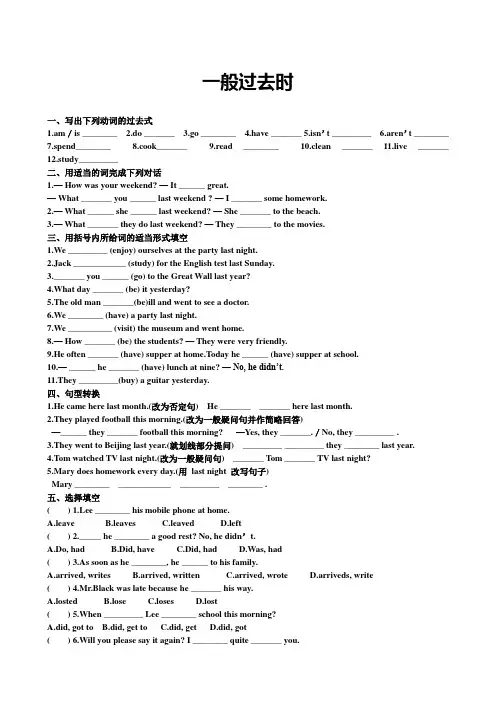
一般过去时一、写出下列动词的过去式1.am/is ________2.do _______3.go ________4.have _______5.isn’t _________6.aren’t ________7.spend________8.cook_______9.read ________ 10.clean _______ 11.live _______12.study_________二、用适当的词完成下列对话1.— How was your weekend? — It ______ great.— What _______ you ______ last weekend ? — I _______ some homework.2.— What ______ she ______ last weekend? — She _______ to the beach.3.— What _______ they do last weekend? — They ________ to the movies.三、用括号内所给词的适当形式填空1.We _________ (enjoy) ourselves at the party last night.2.Jack ____________ (study) for the English test last Sunday.3._______ you ______ (go) to the Great Wall last year?4.What day _______ (be) it yesterday?5.The old man _______(be)ill and went to see a doctor.6.We ________ (have) a party last night.7.We __________ (visit) the museum and went home.8.— How _______ (be) the students? — They were very friendly.9.He often _______ (have) supper at home.Today he ______ (have) supper at school.10.— ______ he _______ (have) lunch at nine? —No, he didn’t.11.They _________(buy) a guitar yesterday.四、句型转换1.He came here last month.(改为否定句) He _______ _______ here last month.2.They played football this morning.(改为一般疑问句并作简略回答)—______ they _______ football this morning? —Yes, they _______./No, they _________ .3.They went to Beijing last year.(就划线部分提问) _________ _________ they ________ last year.4.Tom watched TV last night.(改为一般疑问句) _______ Tom _______ TV last night?5.Mary does homework every day.(用last night 改写句子)Mary ________ ____________ _________ ________ .五、选择填空( ) 1.Lee ________ his mobile phone at home.A.leaveB.leavesC.leavedD.left( ) 2._____ he ________ a good rest? No, he didn’t.A.Do, hadB.Did, haveC.Did, hadD.Was, had( ) 3.As soon as he ________, he ______ to his family.A.arrived, writesB.arrived, writtenC.arrived, wroteD.arriveds, write( ) 4.Mr.Black was late because he _______ his way.A.lostedB.loseC.losesD.lost( ) 5.When _________ Lee ________ school this morning?A.did, got toB.did, get toC.did, getD.did, got( ) 6.Will you please say it again? I ________ quite _______ you.A.didn’t, hearB.don’t, heardC.didn’t, heardD.don’t, hear ( ) 7.______ you ________ at six o’clock yesterday?A.Do ,get upB.Did, get upC.Do, got upD.Did, got up( ) 8.What did you see _________?A.nowB.every dayC.these daysD.just now( ) 9.He went into the room and _______ the door.A.lockB.lockingC.locksD.locked( ) 10.—What _____ you _______ last week? —I bought a bag.A.did ,buyB.did , boughtC.do, buyD.do, bought( ) 11.—_____ he ____ his lunch? —Yes, he did.A.Does ,hasB.Does, haveC.Did, haveD.Did, had( )12.—Did the thieves _____ into the car? —No, they______.A.fell, didn’tB.fall(落下), didC.jump(跳), didn’tD.jump, did( ) 13.-When did May come back from Hong Kong? -She __ from Hong Kong last Friday.e backes backC.returned backD.came back( ) 14.____ she _____ this dictionary in the bookshop nearby last week?A.Did, buyB.Does, buyC.Did, boughtD.Does, buys( ) 15.He ____ to the station this morning and was______ for the train.A.hurry, in timeB.hurries, on timeC.hurried, in timeD.hurried, at time( ) 16.Where _____ Uncle Sun yesterday? A.was B.were C.did D.does( ) 17.—Have you seen him today? —Y es, I ____ him this morning.A.seeingB.seeC.seesD.saw( ) 18.He ______ worried when he heard the news.A.is B.was C.does D.did ( ) 19.There _____ a telephone call for my brother Steven yesterday?A.isB.areC.wasD.were( ) 20.Liu Fengwei _____ three yuan for the lost library book.A.paidB.payC.spentD.lost( ) 21.He ____ in this school in 1958.A.taughtB.teachC.teachesD.teaching( ) 22.They _____ tired so they stopped ____ a rest.A.are, haveB.were, haveC.were, to haveD.are, having( ) 23.Yesterday I _____ in bed all day because I had a fever.yB.lieidD.lied( ) 24.It was raining hard when he ____ home.A.gotB.getC.getsD.was getting( ) 25.She said her brother ____ in Beijing.He ______ to Japan on business last week.A.wasn’t, wentB.hasn’t, wentC.wasn’t, goD.isn’t, went六、改错题1.How is Jane yesterday?2.He go to school by bus last week.3.He often goes home at 6:00 last month.4.I can fly kites seven years ago.5.Did you saw him just now.6.Tom wasn’t watch TV last night.7.I didn’t my homework yesterday.8.He wait for you three hours ago.9.Who find it just now ?10.What did he last week?七、用所给动词的适当形式填空1.Tom and Mary ___________ (come) to China last month.2.Mike _________________(not go) to bed until 12 o’clock last night.So I _______ (get ) up late.3.Mary __________ (read) English yesterday morning.4.There _________ (be) no one here a moment ago.5.I ___________ (call) Mike this morning.6.I listened but ___________ (hear) nothing.7.Tom ___________ (begin) to learn Chinese last year.st week we _________ (pick) many apples on the farm.9.My mother ________________ (not do) housework yesterday.10.She watches TV every evening.But she _______________ (not watch) TV last night.11.________ your father ________ ( go ) to work every day last year?12.—What time _______ you _______ (get) to Beijing yesterday? —We __________ (get) to Beijing at 9:00 in the evening.13.What __________ (make) him cry (哭) just now?st year the teacher ___________ (tell) us that the earth moves around the sun.15.There ____________ a telephone call for you just now.(be)16.There __________ not enough people to pick apples that day.( be)17.There _____________ any hospitals (医院) in my hometown (家乡) in 1940. ( be not)18.There ____________ enough milk at home last week, wasn’t there?19.Eli ____________ to Japan last week. ( move)20.–When _______ you _________ (come) to China? - Last year.21.Did she ________ (have) supper at home? 22.Jack ____________ (not clean) the room just now.23._________ (be) it cold in your city yesterday?24.How many people ________ (be) there in your class last term?25.It ________ (be) hot yesterday and most children _______ (be) outside.26.There ________ (be) a football match on TV yesterday evening, but I _________ (have) no time to watch it.27.He ate some bread and _________ (drink) some milk.28.________ he __________ (finish) his homework last night?29.I__________(be) tired yesterday. 30.I ___________(gain ) Arts degree last year.31.What _________ you ___________ (do) last night?32.My grandfather _________ (leave) Hong Kong for New York in 1998.33.What _______ he ________ (do) yesterday?st week I _______ (buy) a new bike. 35.He ________ (be) here just now.36.He __________ (not find ) his key last night. 37.My father __________ (drink) a lot of wine yesterday.38.________ you ________ (finish) your homework yesterday?39.I ________ (eat) some eggs and bread this morning.40.Her mother __________ (not give) the girl any present.st year Mr.Smith _____ (go ) to China and Japan.42.He _____ (have) a wonderful time.43.He _____ (do) a lot of different things and _____ (talk) to a great number of different people.44.He _____ (eat) Chinese and Japanese food and _____ (visit) a lot of interesting places.45.When he _____ (go) back to England, he _____ (be) very tired.46.A week ago, Kitty and Ben _________ (be) in the countryside.47.At first, the wind _________ (blow) lightly.48.The leaves ___________ (blow) slightly in the wind.49.They ________ (fly) their kite happily in the gentle breeze.50.Suddenly, the wind ________ (become) stronger.51.The clouds in the sky _______ (move) quickly.52.Leaves ________ (fall) from trees.53.The sky became dark.Kitty and Ben ________ (go ) home immediately.54.Kitty and Ben ________ (stay) at home.They __________ (watch) TV.65.The big clean-up ________ (begin) immediately.Kitty and Ben went outside again.一、按要求变换句型。
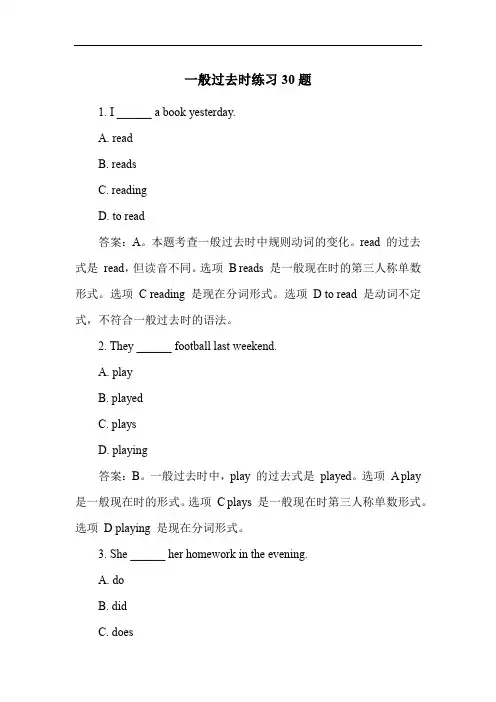
一般过去时练习30题1. I ______ a book yesterday.A. readB. readsC. readingD. to read答案:A。
本题考查一般过去时中规则动词的变化。
read 的过去式是read,但读音不同。
选项B reads 是一般现在时的第三人称单数形式。
选项C reading 是现在分词形式。
选项D to read 是动词不定式,不符合一般过去时的语法。
2. They ______ football last weekend.A. playB. playedC. playsD. playing答案:B。
一般过去时中,play 的过去式是played。
选项A play 是一般现在时的形式。
选项C plays 是一般现在时第三人称单数形式。
选项D playing 是现在分词形式。
3. She ______ her homework in the evening.A. doB. didC. does答案:B。
do 的过去式是did,这里是一般过去时,要用过去式。
选项 A do 是一般现在时。
选项C does 是一般现在时第三人称单数形式。
选项D doing 是现在分词形式。
4. We ______ to the zoo last month.A. goB. wentC. goesD. going答案:B。
go 的过去式是went,last month 表明是一般过去时。
选项 A go 是一般现在时。
选项C goes 是一般现在时第三人称单数形式。
选项D going 是现在分词形式。
5. He ______ very happy yesterday.A. isB. wasC. areD. were答案:B。
is 的过去式是was,he 是第三人称单数,yesterday 提示用一般过去时。
选项 A is 是一般现在时。
选项C are 是一般现在时第二人称和复数形式。
选项D were 是一般过去时复数形式。
(英语)英语一般过去时专项训练100(附答案)及解析一、初中英语一般过去时1.——Nobody but you _______ late for school this morning.——Sorry , I _______ to school when it began to rain heavily.A. was , wentB. were ,was goingC. was , was about to goD. is, am going【答案】C【解析】【分析】句意:除了你今天早上没人迟到了。
对不起,我即将上学的时候,天开始下起了大雨。
Be about to do sth即将做某事,所以选C。
【点评】考查主谓一致。
2.—Linda hasn't come to the party yet.—But she . I think I have to call her again.A. promisesB. promisedC. will promise【答案】 B【解析】【分析】句意:——琳达还没来参加聚会。
——但她答应了。
我想我得再给她打个电话。
根据 I think I have to call her again. 我得再给她打个电话。
可知她答应了,应用一般过去时,故选B。
【点评】考查动词一般过去时的用法。
3.—My car ________ yesterday. Could you please give me a ride tomorrow?—I'm sorry I can't, I'm ________ Dalian tomorrow morning.A. breaks down; flying atB. has broken down; flying atC. broke down; flying toD. had broken down; flying to【答案】 C【解析】【分析】句意:——我的车坏了,你明天能搭我一程吗?——对不起我不能,我明天早上要坐飞机去大连。
【英语】一般过去时专项练习题及答案详解一、单项选择一般过去时1.His earlier concert in Shanghai____a big success.It was the first time the Taiwan singer____a concerton the mainland.A.is;held B.was;held C.had been;would hold D.was;had held 【答案】D【解析】【详解】考查时态。
句意:他早些时候在上海的演唱会非常成功。
这是这位台湾歌手第一次在大陆举办音乐会。
第一空:根据句意可知,此处描述的是过去的事情,应使用一般过去时;第二空:It was the first time后面的从句谓语动词使用过去完成时。
故选D。
2.122.With bans on fireworks, at one point, almost 300 cities across my country ____ rules banning the use of fireworks.A.have B.have had C.are having D.had【答案】D【解析】D考查动词。
句意:在禁止燃放烟花爆竹的情况下,我国近300个城市禁止燃放烟花爆竹。
由时间状语at one point可知是发生在过去的动作,一般过去式,故选D。
点睛:时态是经常考到的知识点,在选择时一定要观察句子的时间状语,和上下语义。
3.—That must have been a hard project?—Yeah, it _____ us a whole year to finish the work.A.took B.has takenC.takes D.was taking【答案】A【解析】考查时态。
That must have been ……是对过去情况的判断,所以 it ___us a whole week to get there. 是在陈述过去的一个事件,要用过去时。
一般过去时专项训练题及答案题目一:选择填空1.I _______ a new car last year.A. boughtB. buyC. am buyingD. have bought2.He _______ English for two years before he moved to Canada.A. studiedB. studiesC. is studyingD. has studied3.We _______ a great time at the party yesterday.A. hadB. haveC. are havingD. has4.Amy _______ her bike in the park when it started raining.A. rodeB. rideC. is ridingD. has ridden5.They _______ to the beach every summer when they were kids.A. wentB. goC. are goingD. have gone答案: 1. A2. D3. A4. A5. A题目二:改错题请根据所给句子的语境和动词的时态,找出错误并修改。
1.Yesterday, I buyed a new book at the bookstore.错误:buyed修改:bought2.Sarah go to the gym every day last week.错误:go修改:went3.We are watch a movie together last night.错误:are watch修改:were watching4.Tim and John was best friends when they were in school.错误:was修改:were5.She goed to the market this morning to buy some groceries.错误:goed修改:went答案: 1. Yesterday, I bought a new book at the bookstore. 2. Sarah went to the gym every day last week. 3. We were watching a movie together last night. 4. Tim and John were best friends when they were in school. 5. She went to the market this morning to buy some groceries.题目三:根据所给情景,写出合适的一般过去时句子1.你的朋友昨天生日,你送给了他一份礼物。
(完整版word)英语一般过去时专项练习题含答案一、初中英语一般过去时1.My mind wasn't on what he was saying so I'm afraid I ____________ half of it.A. missedB. was missingC. will missD. would miss【答案】A【解析】【分析】句意:本题翻译为:我的心思不在他刚才所说的内容上,所以我担心我刚才错过了一半的内容。
A. missed一般过去时;B. was missing过去进行时C. will miss一般将来时;D. would miss过去将来时。
根据句意,可知表示过去错过了一半的内容,所以用一般过去时,故选A。
【点评】此题考查一般过去时的用法。
2.-Have you finished your homework?-Yes, I have. I it this morning.A. finishB. finishesC. finishedD. have finished【答案】C【解析】【分析】句意:你完成你的作业了吗?——是的,我完成了。
我今天早晨完成的。
结合语境可知下文描述的是过去某时发生的动作,故用一般过去时态。
选C。
【点评】英语中的时态主要是借助于时间状语与上下文语境来进行判断。
解答此类题型,首先要注意句子中的时间状语,如果没有则要通过分析上下文,结合语境来判断句子的时态。
英语疑问句中一般具有时态上的对应关系,注意结合这一特点进行区分。
3.After Steven sent some e-mails ,he______ surfing the Internet.A. startsB. has startedC. will startD. started【答案】 D【解析】【分析】句意:Steven发了一些电子邮件之后,他就开始上网冲浪。
start开始,是一个动词。
一般过去时专项训练题及答案五个题目一:选择正确的动词形式填空1.He ________ (go) to the park yesterday.2.They ________ (play) basketball last night.3.She ________ (watch) a movie with her friends last weekend.4.I ________ (visit) my grandparents last summer.5.We ________ (eat) dinner at a restaurant last night.答案:1.went2.played3.watched4.visited5.ate题目二:给下列句子改写成一般过去时1.He often goes to the gym. → ________.2.They visit their grandparents every Sunday. → ________.3.She watches TV every evening. → ________.4.I play soccer with my friends after school. → ________.5.We eat breakfast at home every day. → ________.答案:1.He went to the gym.2.They visited their grandparents last Sunday.3.She watched TV yesterday evening.4.I played soccer with my friends after school.5.We ate breakfast at home yesterday.题目三:将下列句子变为否定句1.He played soccer last Sunday. → ________.2.They went to the beach yesterday. → ________.3.She visited her parents last weekend. → ________.4.I went shopping with my friends yesterday. → ________.5.We ate dinne r at a restaurant last night. → ________.答案:1.He didn’t play soccer last Sunday.2.They didn’t go to the beach yesterday.3.She didn’t visit her parents last weekend.4.I didn’t go shopping with my friends yesterday.5.We didn’t eat dinner at a restaurant last nig ht.题目四:给下列句子变为疑问句1.She watched a movie last night. → ________?2.They studied English last weekend. → ________?3.He played basketball yesterday. → ________?4.We visited the museum last month. → ________?5.You went to the party last Friday. → ________?答案:1.Did she watch a movie last night?2.Did they study English last weekend?3.Did he play basketball yesterday?4.Did we visit the museum last month?5.Did you go to the party last Friday?题目五:根据提供的信息填空,使用一般过去时态1.We _____ (go) to the zoo yesterday.2.She _____ (run) in the marathon last week.3.They _____ (clean) the house yesterday.4.He _____ (paint) a picture last weekend.5.I _____ (finish) my homework last night.答案:1.went2.ran3.cleaned4.painted5.finished。
英语一般过去时专项训练一、单项选择一般过去时1.Not until recently ____________ the development of tourist-related activities in the rural areas.A.they had encouraged B.had they encouragedC.did they encourage D.they encouraged【答案】C【解析】【详解】考查部分倒装。
句意:直到最近他们才鼓励在农村地区开展与旅游业有关的活动。
当not until所引导的时间状语放在句首时,主句要使用部分倒装。
陈述过去发生的事情用一般过去时,故C项正确。
【点睛】部分倒装是指将谓语的一部分如助动词或情态动词提至主语之前。
如果句子的谓语没有助动词或情态动词,则需添加助动词do, does或did,并将其置于主语之前。
一、句首为否定或半否定的词语如no, not, never, seldom, little, hardly, at no time, in no way, not until 等时,句子要倒装。
如:1. Nowhere will you find the answer to this question. 无论如何你不会找到这个问题的答案。
2. Not until the child fell asleep did the mother leave the room. 母亲一直到孩子入睡后才离开房间。
Not until位于句首引导的主从复合句,主句倒装,从句不倒装。
二、so, neither, nor位于句首时,表示"也"、"也不" 的句子要部分倒装。
如:1. Tom can speak French. So can Jack. 汤姆会讲法语,杰克也会。
2. If you won’t go, neither will I.你不去,我也不去。
三、only位于句首,且强调状语时,句子也必须用部分倒装。
如:1. Only in this way, can you learn English well.2. Only after being asked three times did he come to the meeting.四、其他部分倒装的情况。
1. so…that… 句型中的so 位于句首时,句子需倒装。
如:So frightened was he that he did not dare to move an inch. 他害怕得很,动也不敢动。
2. 在某些表示祝愿的句型中。
如: May you all be happy. 愿你们都快乐。
考点:考查部分倒装2.--- Such a small mistake could have been avoided.--- Yes. But I too nervous to see the zero.A.am B.have beenC.was D.had been【答案】C【解析】【详解】考查时态。
句意:——这样一个小错误本来是可以避免的。
——是的。
但是我太紧张了,看不到零点。
由could have been avoided(本来可以避免)可知双方在谈论过去的事。
故选C。
3.The young couple _______ as volunteer teachers for a whole year during their stay in Yunnan. A.have worked B.had workedC.worked D.have been working【答案】C【解析】【详解】考查时态。
句意:在云南期间,这对年轻的夫妻做了一整年的志愿者。
根据句意可知他们是在云南期间做志愿者的,使用一般过去时描述过去发生的事情,并没有延续到现在,也没有表现出对现在的影响,故C项正确。
4.—I wonder what makes you a successful manager.—I ________ as a waiter for five years,which contributes a lot to my today’s work.A.serve B.have servedC.had served D.served【答案】D【解析】试题分析:句意:我想知道是什么让你成为一个成功的经理?—我做服务员5年,这对我今天的工作有很大的贡献。
因为这个经理过去是服务员,所以用一般过去式,选D。
考点:考查时态5.--How did you find the film yesterday evening?--Just so so. It _______ pace.A.lacked in B.lackedC.was lacking D.was lacked in【答案】B【解析】试题分析:--你认为昨天晚上的电影怎样?---一般般吧。
这部电影缺少节奏。
Lack,及物动词“缺少”;be lacking in “缺少”,根据前句内容可知是讲述过去的情况,用过去时,而且lack没有进行时,选B。
考点:考查动词用法。
6.---- Have you ever been to Provence which is home to lavender(薰衣草) in Paris?---- Yes, only once. I ________ there for a week.A.had stayed B.were staying C.have stayed D.stayed【答案】D【解析】【详解】考查时态。
句意:—你去过巴黎薰衣草的故乡普罗旺斯吗?—是的,只有一次。
我在那里呆了一个星期。
此处是指过去发生的一件事,与现在无关,所以用一般过去时态,故答案为D。
7.-I'm told you had a car accident. I think it must have been a terrifying experience.-Yeah. I in the damaged car, unable to move.A.had got trapped B.have got trapped C.get trapped D.got trapped【答案】D【解析】【详解】考查时态。
——有人告诉我你出车祸了,那一定是一次非常恐怖的经历。
——是的,我被困在被撞毁的汽车里,动弹不得。
had表明事情发生在过去,应该用一般过去时,故D项正确。
8.---Haven’t you finished the construction of the teaching building to be used next term?--- Yes. My workers and I _____ on it for over nine months.A.have worked B.have been workingC.worked D.had worked【答案】C【解析】【详解】考查时态。
句意:—你们还没有建好下学期要用的教学楼吗?—是的。
我和我的员工花了九个多月的时间来做这件事。
结合句意可知这里在讲一件过去的事情,所以句子用一般过去时态,故选C。
9.I would have attended Jacky Cheung's live music concert had it been possible, but I ______ so busy at that time.A.had been B.wereC.would be D.was【答案】D【解析】【详解】考查时态。
句意:如果可能的话,我会参加张学友的现场音乐会,但那时我很忙。
前句是与过去事实相反的虚拟语气,所以判断是陈述的过去的事情,故用一般过去时。
故选D。
10.In a room above the store, where a party ______, some workers were busily setting the table.A.was to be held B.has been held C.will be held D.is being held【答案】A【解析】【详解】考查时态。
句意:在商店楼上的一个房间里,将举行一个聚会,一些工人正忙着摆桌子。
where引导的定语从句中,主语a party和hold之间是被动关系,且表示将来,用“be+动词不定式的被动式”,再根据主句时态were busily setting,可知答案为A。
11.While watching TV, ______.A.someone came in B.the telephone rangC.we saw someone coming in D.someone appearing【答案】C【解析】【详解】考查动词时态。
句意:在看电视的时候,我们看见有人进来了。
while引导时间状语从句,后面是主句,且从句和主句主语一致都是we,且根据句意应用一般过去时,故选C。
【点睛】当分词做状语的时候,如果构成分词的动词与句子的主语构成主动关系,就使用现在分词做状语;当二者构成被动关系,使用过去分词做状语。
如果分词的动作发生在谓语动词之前,就使用分词的完成式。
如果分词与句子的主语没有关系,可以使用状语从句或者独立主格结构。
12.The naughty boy _____ quickly, otherwise he would have been caught by the angry headmaster.A.had run away B.ran awayC.should run away D.were to run away【答案】B【解析】【详解】考查一般过去时。
句意:这个淘气的男孩跑得很快,要不然就会被生气的校长抓住。
分析语境可知,此句是对过去的虚拟,otherwise相当于If the naughty boy hadn’t run away quickly,已经暗含了条件,所以前面的空格只是对过去发生的事实进行陈述,要用一般过去时。
故选B。
13.They ________ in Holland for ten years. Now they have settled down in Paris.A.lived B.have lived C.had lived D.were living【答案】A【解析】【详解】考查动词时态。
句意:他们在荷兰生活过十年。
现在他们定居在巴黎。
根据后句中的现在完成时态可知,他们在荷兰生活是单纯发生的过去的事情,所以应该用一般过去时,故选A。